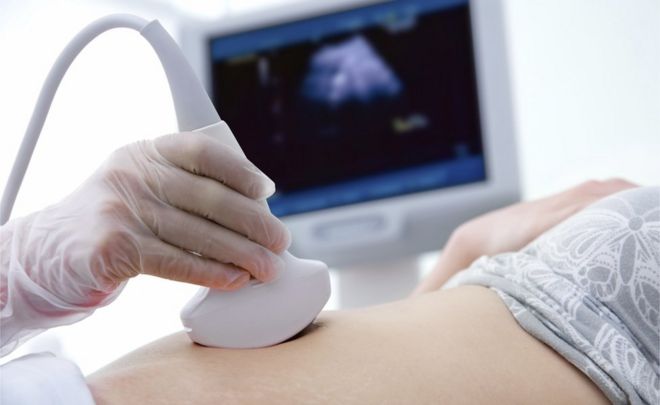
Many people have certain expectations about the circumstances that lead women to have an abortion. Here one woman who already happily had two children talks about her decision.
In January 2010 I was 35 and had two very young children - a two-and-a-half-year-old, and a one-year-old. Life was good - I was happy, we owned a house, and our girls were beautiful, very entertaining, healthy, and exhausting.
In lots of ways I was still learning how to be a mother - I struggled with my temper, sometimes felt as if I was not totally in control of the situation, and I was often on my own with my daughters, as my partner worked long hours.
So when I found out that I was pregnant again, my feelings weren't straightforward. I had the strange, queasy mixed feelings that are unique to an unexpected pregnancy, and that I'd felt once before, when I was 24.
There's the intense excitement and possibility, the feeling quite literally of pregnancy, which is primeval, physical, and inexorable. But this elation was chased by a sinking feeling - the panic, the trap, of a pregnancy I wasn't sure I wanted... a baby I was pretty sure we couldn't cope with.
I had two children. I knew what was involved. I knew about the late nights, the early mornings, the long-running arguments about who's had the least sleep that week, the mounds of washing, the financial stresses, the diplomatic complexity of negotiating with a toddler. I was honest enough to know that I was only just dealing with two children - and I definitely knew I wasn't a good enough mother to look after another baby as well.

A viewpoint with a different perspective on abortion will follow at a later date. Anyone who wishes to contribute can use the comments form at the bottom of the page.

I was also pretty sure that my two living, breathing daughters would suffer if I had a third baby - losing out on attention and stability which might affect their characters for life. My eldest had already acted very jealously when our youngest one was born, flinging open the door, stamping her foot and bellowing "NO!" every time she saw her breastfeeding. In fact, I was already wondering whether the age gap was way too small between those two.
For these reasons it did not take long for my partner and I to make the decision to end the pregnancy.
I am being very honest here. I know one isn't meant to talk about a pregnancy in this bald, pragmatic way. Pregnancy is mysterious, it's romantic, it's miraculous - you're not supposed to weigh up whether it's convenient, or practical. But it is also the messy, violent and lifelong business of bringing a new child into your family.
You have to look after that person, for life, preferably without losing your marbles or going bankrupt. You have to be absolutely sure you can do it to the very best of your ability. I'm not ashamed to say that I was analysing this pregnancy in these terms. I am a realist. I also know my limits.
The next week, I booked into the clinic and on Sunday morning I went alone on the train. I was five weeks pregnant.
I knew vaguely what to expect - I had had an abortion once before, when I was 24. Back then, I had a general anaesthetic, and stayed at the clinic all day. But this time was different - I was on my own, and I had the feeling that I wanted to do this as quickly and simply as possible and get back home to look after the girls. And I hadn't told anyone about it - the only people who knew were my partner and I.
The girls had been told I was out for the day with friends, and I hadn't told my wider family because I didn't want anyone feeling sad or upset about something which I knew was the right thing to do.

Abortion rates
 istock
istock- In 2014, 54% of women undergoing abortions in England and Wales had had one or more previous pregnancies that resulted in a live or stillbirth
- In 2004 the rate of women aged 30 to 34 having an abortion was 14.5 per 1,000. It had risen to 16.5 per 1,000 in 2014. Rates for women aged 35 or over have gone up from 6.8 per 1,000 to 7.4
- Six in 10 American women having an abortion are already mothers
Sources: UK Department of Health and the Guttmacher Institute, US.

I think a lot of the people at the clinic that day were women in the same situation as me - mothers of families, who had perhaps got pregnant quite quickly after giving birth to a baby.
The post-partum months are a period when some women are more fertile, and may find it particularly easy to get pregnant. They may also be under the misapprehension that breastfeeding and the fact they're not having regular periods acts as a kind of contraceptive. In fact, in 2014, 54% of women having an abortion had already given birth before.
Because I had recently given birth, the doctor that saw me before the abortion suggested that I had it done with no anaesthetic. I agreed, as I had managed childbirth twice and was sure that I could cope with quite a lot of pain and discomfort. It also meant that I would recover quickly from the operation and be back at home quickly.
This was the other way that this second abortion was different from my first - it was much more uncomfortable, and felt much more real. The first time I had woken up in a bed feeling as if I'd had a good night's sleep - the second time I felt everything.
I was five weeks pregnant. The five-week-old foetus is about the size of a sesame seed - more like a tiny tadpole than a human. My five-week-old foetus could have developed into a baby which might be alive today, but we genuinely did not think we could give that baby the love, stability, and support it needed. We stand by that decision today and, I have to say, give very little thought to the abortion or to the baby that might have been.

Like it or not, abortion is an essential part of birth control for many women. Abortions save millions of families from the stress and unhappiness caused by unwanted pregnancies.
There are many reasons why women get pregnant by accident - by mistake, by contraceptive failure, by disorganisation, by sexual assault. I do not think that women should be made to pay for these accidents by giving birth. In any other accident you would do everything in your power to make it better - you'd be rushed to hospital, have emergency surgery, you'd undergo months of physiotherapy. It is only in the case of accidental pregnancy that people call for decades of medical science and progress to be denied so that nature can take its course and an unwanted child brought into the world.
It seems to me that people who are against abortion are interested in simplifying life. The unborn child is a simple symbol - untarnished, pure and full of promise. But life is not simple.



No comments:
Post a Comment